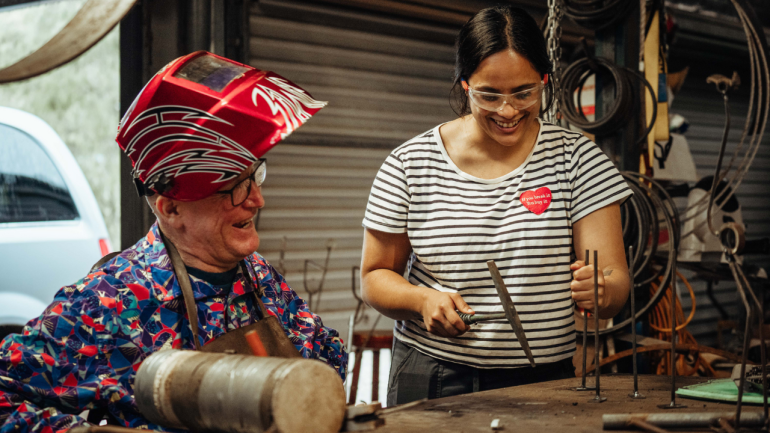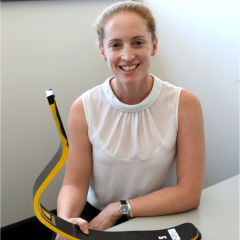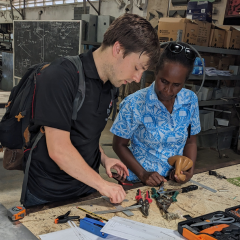UNSW academic enables her students to solve real-world problems and make a positive impact
Published 2 September 2024
From the time she started in academia as a biomedical engineer, Associate Professor Lauren Kark had a dream: a place where students and end-users could work together to design, test, and implement exciting innovations in assistive technology: engineering and design solutions that would solve real-world problems. “Previously, many engineering students would have graduated biomedical engineering having never met someone with a disability who would like to do something but currently can’t, or never met a clinician,” she says.
“My big goal was to produce very competent, hopefully excellent, contextual operators: people who really understand the why before they go through to the how.”
That dream became a reality in 2019, when she launched the Assistive Technology (AT) Hub at UNSW’s Kensington campus. She remembers, “I returned from maternity leave...and got [to teach] a course that had something to do with what I wanted, and I thought, ‘Let’s do something brave. I like taking a bit of a risk.’”
She redesigned the course – and implemented the AT Hub itself – to fulfil two purposes. “The AT Hub provides a unique and inspiring educational experience, but also fills a service gap in AT provision in the community. I graduated with mechanical engineering, but it was very much a theoretical degree, and I wanted to give students hands-on experience. I think also our emerging generation really do want to make a difference and have an impact, and if you give them that opportunity, you’ve got their motivation, and if you’ve got their motivation, you can guide them in their education, and there are beneficial educational outcomes."
"For many people who need assistive technology, it doesn’t need to be high-tech – it’s projects that can be done by students. So what a wonderful way to merge these two goals and to inspire, facilitate, and empower students to have an impact while they’re students, but also to show them what impact they can have with their engineering degree.”
A/Prof. Kark adds that the AT Hub is very much a place for collaboration. “Everyone’s an expert of their own experience. We can never assume that we know exactly what everyone else has experienced in life. So while we may be able to empathise, until we have the voice of that person with the lived experience, we can’t truly understand or appreciate some of the pinch points and some of the pain points. The fact that the end-users of the new technologies are co-creators and not clients makes for a flat management structure, so it ensures that all voices are heard equally. We did some research very early on about what to call it. And there was very strong opposition to calling it something like a clinic, because of those perceptions of power imbalances. Calling it “the AT Hub” levels the playing field and ensures that everyone has the opportunity to speak up and to contribute equally.”
A/Prof. Kark also notes that the collaboration goes beyond just the students and the end-users. “We’ve got great support from our Makerspace Technical offices, and we often get other academics involved if I don’t have the skill set. So you’ve got this melting pot of stakeholders who are all super-motivated to get a good outcome."
"It’s amazing to see: you’ve got the industrial designers, the engineers, the technicians, the clinicians, the end-users, and everyone’s got their own ideas. And to see this divergent thinking start to converge on a common goal is pretty incredible. While the initial goal for the students might be marks, that becomes secondary because it’s all about ensuring a great outcome.”
She describes students’ involvement in the AT Hub as “sort of a course, but more a suite of experiences” that can involve coursework and assessment, but also participation in vertically integrated projects, postgraduate research, and international outreach, such as a multi-year involvement with end-users in the Solomon Islands and a new student-led project in Uganda. Projects can involve “everything and anything,” she adds. Project areas have included sports, visual arts, music, clinical assistive tools, and “sometimes just activities of daily living”. Some examples are captured in the videos here and here.
The AT Hub project-development process provides a unique environment for students to develop critical thinking, problem-solving skills and professional confidence. “We give the students a really brief outline, with almost no information, and deliberately so,” she says. “Part of it is talking with the person and extracting the user requirements. The students need to be able to empathise to do that, and they need to communicate clearly. And so I think that this level of ambiguity before they start is one of the challenges, really – to have a conversation with someone, and not a technical conversation – 'How much do you want it to weigh? What colour should it be?' You need to weave those questions into the conversation to develop that rapport and empathy. I think that’s where the students really struggle, but where they feel a great sense of satisfaction once they’ve worked that out. From the beginning of the term, when students are completely overwhelmed, you see them transform. They can say, ‘It’s okay for me to sit in this ambiguity, to sit in this chaos, to sit in the unknown. I will get through it, and this is how I’m going to do it.’ Imagine having that experience going into your first job knowing that you won’t know everything, but you’ll get through it. You’ll be okay.”
This article was written by Laura E. Goodin.


